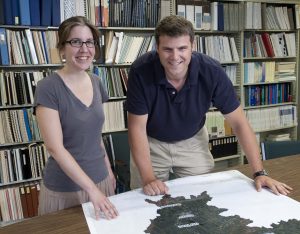Training The Next Generation of Leaders and Problem-Solvers

Bridie McGreavy, a postdoctoral researcher on the NEST Safe Beaches and Shellfish team and a Mitchell Scholar, is among a growing number of Mitchell Center graduates. “A highlight of my work with the Mitchell Center has been the development of multiple partnerships across disciplines and with different types of stakeholders,” McGreavy says. “I did not realize that my academic experience would result in so many deep and productive relationships on which I will continue to build for the remainder of my career.”
McGreavy and other recent Mitchell Center graduates already have helped develop on-the-ground sustainability solutions as key members of research teams. For example, as members of the “Alternative Futures” team, Spencer Meyer and Michelle Johnson, in close collaboration with stakeholders, played key roles in creating the award-winning Maine Futures Community Mapper (MFCM) (available at http://www.mainelandusefutures.org/). This groundbreaking, web-based tool allows cities and towns to identify which lands are most suitable for development, conservation, forestry or agriculture, as well as identify potential conflicting and compatible land uses.
Now that they have completed their Ph.D.s, these graduates are contributing their expertise in a range of settings. Meyer, who won UMaine’s 2014 President’s Research Impact Award for leading the development of the MCFM, is now a fellow at both Yale University’s School of Forestry and Environmental Studies and The Nature Conservancy. Johnson joined the U.S. Forest Service’s New York City Urban Field Station as an interdisciplinary scientist this fall. Other graduates have landed positions at the University of Washington, the University of Rhode Island, Cornell, Dartmouth, the World Agroforestry Centre in Nairobi, and other leading academic institutions and organizations.
The work of Mitchell Center faculty and students is rippling out beyond Maine’s borders, generating real-world solutions and advancing the field of sustainability science with nearly 250 research papers published to date. This growing body of knowledge will help to educate a new generation of more nimble problem-solvers—and help universities better align research with the resources and information society needs to move toward a sustainable future.
